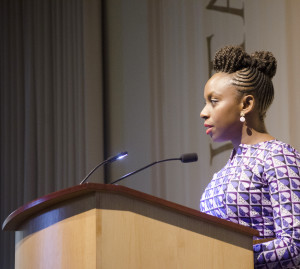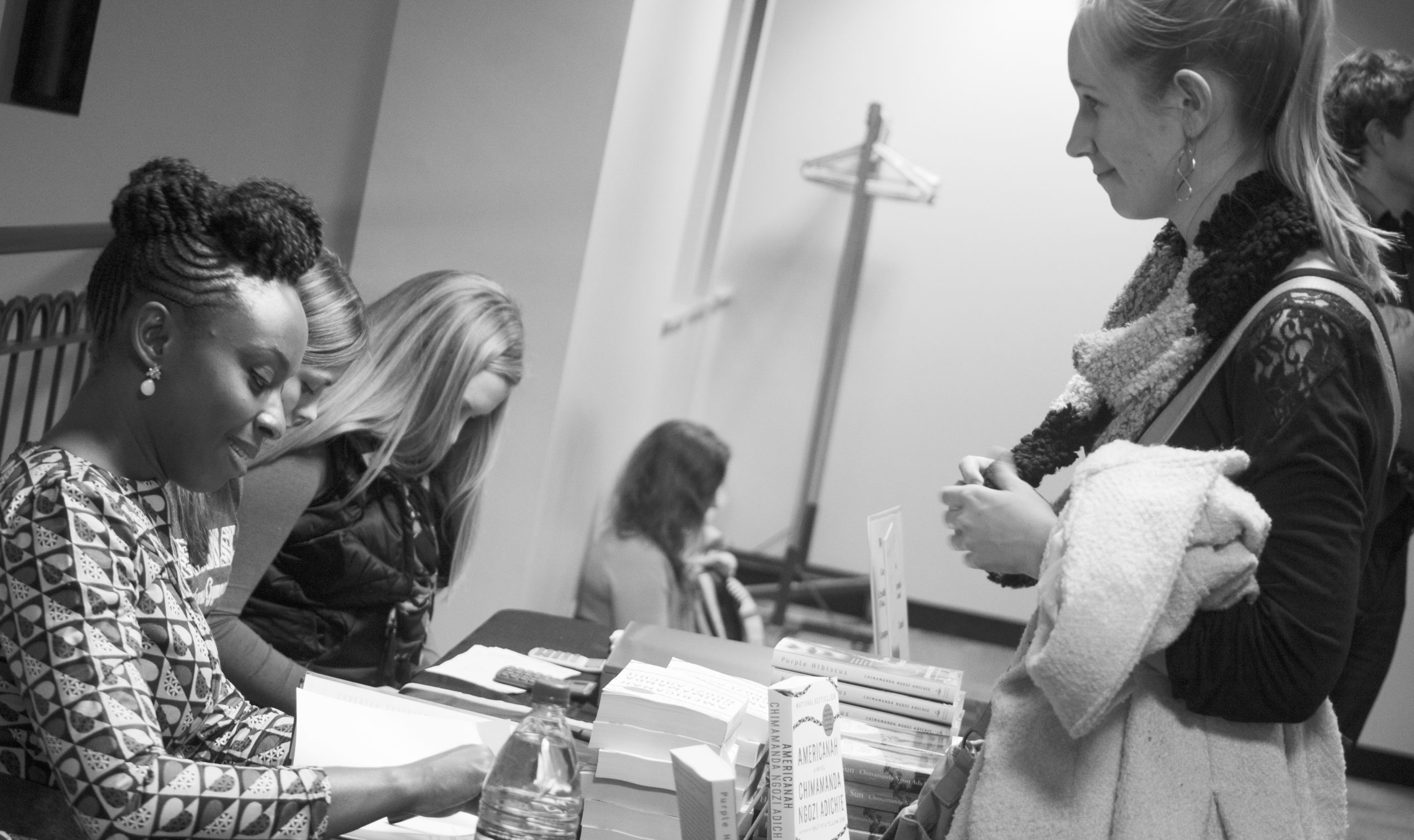Alumni Hall lacked a sufficient number of seats to hold the hundreds of enthusiastic attendees of this year’s Moe Lecture in Gender, Women, and Sexuality Studies, held on March 10. Nigerian Author Chimamanda Ngozi Adichie gave the lecture, titled, “Performing Gender- Sometimes I do, Sometimes I don’t,” which focused on the feminist movement and gender roles in today’s global world.
Adichie’s most well known books include: Purple Hibiscus, Half of a Yellow Sun, and Americanah. The author was also recently recognized and quoted in Beyoncé’s hit song “Flawless.”
Adichie’s short, but impressive introduction, given by Professor Kate Keller was followed by a steady round of applause and cheers from the crowd. Adichie opened her lecture with a series of personal anecdotes that illustrated the significance of gender roles today. She also touched on the definition of feminism and what a feminist is and isn’t.
Lecture attendee Sophomore English and Gender, Women, and Sexuality Studies Major Caroline Pokrzywinski said that the topic of the lecture was well suited to her interests.
“People have been so excited about this, and I mean I have only been here for one and a half years, but I think that this is the most excited I have seen people for an academic speaker in a long, long time . . . but I really love that, because it doesn’t make me feel like so much of a geek for really being obsessed with her because there are a ton of other people who are totally obsessed with her too,” Pokrzywinski said.

Adichi also touched on how feminism relates to culture, highlighting how many similarities in gender expectations are evident in American culture and Nigerian culture, as well as anywhere else in the world.
“Culture is often used for a reason, as an excuse for, injustice. Maybe it’s because of the culture that these things happen — so maybe we need to change the culture,” Adichie said.
Pokrzywinski found that this aspect of cultural feminism stood out to her.
“I think the whole idea of choice and certain aspects of feminism being related to choice and how you portray your gender being related to choice that is a crazy interesting idea that I had never really even thought about before, but also, I think just how much she focused on how we need to start these dialogues between men and women, and women and other women, men and men, to get people inspired and to get people aware, I think that was just really cool,” Pokrzywinski said.
Simon Henderson, sophomore from South High School in Minneapolis, says that he attended the lecture to learn more about what feminism looks like from a male perspective.
“I have noticed that a lot of people I know have become feminists recently, and I think it’s awesome, and I agree with the cause, but I think that, as a boy, I am sort of confused as to what my role can be. I have always had an issue with the whole male gender and female gender, and I have never really portrayed myself as a ‘manly man,’ so I was just wondering should I, as someone who has possibly been less effected by gender roles, sit back and let women change what gender roles mean or should I, in my own way, not conform to what male gender roles are,” Henderson said.
Adichie’s lecture was followed by a question and answer session that was over 30 minutes long, yet could not address the large number of questions streaming from the audience.
Henderson, who readily acknowledged in the question and answer session, that he has worn traditionally ‘female’ earrings as a social statement in the past, summed up his reaction to the lecture in one comprehensive thought. “I thought it was truly awesome,” Henderson said.
Pokrzywinski echoed Henderson’s enthusiasm.
“A) she writes so fantastically well, and she writes these beautiful books with characters that are more complex than I think I have ever read in any other book, and B) the fact that, as someone who inspires to be in the feminist movement, having a contemporary feminist role model is really amazing, and having a chance to have her come to school and let me meet her is just a really amazing opportunity and I am so grateful that Gustavus was able to put it on,” Pokrzywinski said.
As the question and answer session came to a close, Adichie summed up her ideas about feminism and gender roles in one a closing statement.
“Roles should be assigned based on ability, not on the reproductive organs you were born with,” Arichie said.

Professor Kate Keller of the History Department introduced Ms. Adichie. Can you please print a correction in the next issue? Thank you!